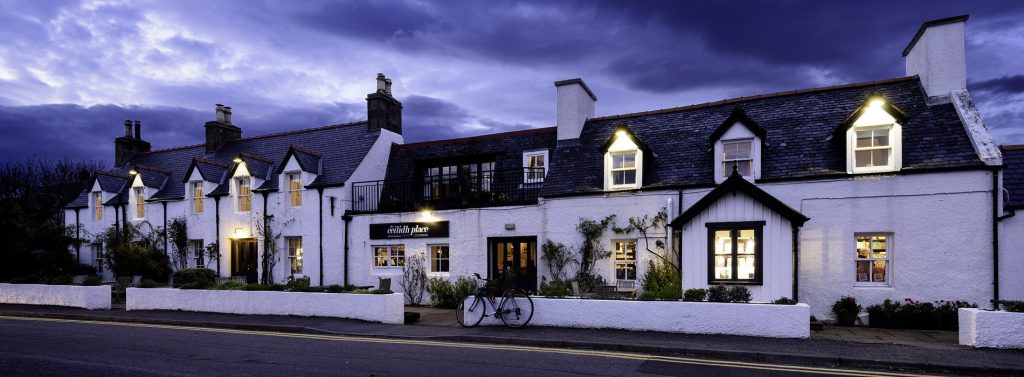
I am looking over the water and mountains from the guest lounge at the Ceilidh Place in Ullapool. The When Mountains Meet company are in various meetings, or walking/swimming/resting before tonight’s sold out 2nd performance at the Macphail Centre. The harbour is filled with traditional boats / luggers and there is music on the shore plus events as part of the Ulluminate science and arts festival. It is a pleasure to be quietly working in the sunshine before attending the show tonight and maybe, just maybe, being awake to see the Aurora in the skies later.
This is my fourth connection with Ullapool over the years, and it is a strange reminder of an Olympic project I suggested for 2012 which never happened. But first allow me to go back.
In 1985 my business partner and I were invited to be Appeal creators/co-ordinators of the planned Highland Hospice in Inverness. I took the lead in creating fundraising committees across the Highlands and together we raised over £220k (which was I’m pleased to say our original target) towards the establishment of this amazing facility now thriving beside the Eden Court Theatre in Inverness. Jean and Robert Urquart, the creators of the Ceilidh Place, were amazing champions for us in the Ullapool area. I spent time there, with the then vicar’s wife establishing a local committee and talking about hospice care with local folk. I spent two years travelling the Highlands with events, sales of work, highland hippo collection boxes, and wonderful people offering help. It was always a highlight driving into Ullapool.
[Although I do remember the first community meeting in the vicarage kitchen where 15+ folk gathered in a wonderfully warm room. As I started to speak every single person in the room put their hands in their bags and pulled out their knitting. The sound of needles was at first rather disconcerting, but the focus in the room was great]
My next joyful encounter with the Ceilidh Place was not till 2005 when we launched the Highland Quest for a New Musical. I was charged by Cameron Mackintosh with creating a search and training programme for writers across the Highlands. We even had a fly-on-the-wall documentary film crew following our every move for a BBC 3hr documentary. By the autumn of 2005 we had shortlisted 50 amazing poets and composers from across generations and Scotland. They were invited to come together in Ullapool where we offered a three day writers retreats led by George Stiles, Anthony Drewe, Carol Metcalf and myself. We used the basis of the Month of Sundays exercises which I had developed from the Tisch School in New York. Here the writers spent glorious time together trying new ideas, new partnerships and pairings, and exploring what they might write for the eventual judges. It was clear how special this process was – it illustrated the depth of music and poetry, storytelling and performance which is at the heart of the Scottish soul. Musical Theatre has always been an essential part of theatre – never thought of as a fluffy uncomfortable black sheep of the cultural sector.
The weekend was not open to the public and we witnessed some of the amazing songs and snatches created by the writers in this fail-safe environment. We put phenomenal trust in the director of the documentary to be sensitive, and Don Coutts the amazing Glasgow docu filmmaker was as good as his word allowing space for the writers to be on camera and off camera. One special moment stays in my memory. A beautiful song was created around the loss of memory during Alzheimer’s by Alison Prince (the writer of Trumpton in my childhood) and John Kielty. It was so moving that the cameraman could not avoid crying and shaking his camera. This was good for many of us working in the other room because the writers agreed to perform it again and we all crowded into the guest lounge I am now sitting in. Despite many crying colleagues the camera man this time held it together and the song can be heard as part of MacMusical the BBC Documentary.
My third encounter with Ullapool is linked with this – it was the final of the Highland Quest at the Macphail Centre with cameras rolling, and amazing company of 80+ actors musicians and technicians overseen by my colleague from Cameron’s Office Maria Baxter as company coordinator on the ground. I chaired the judging panel under the spotlight, with Cameron down the phone line from somewhere in the world.
We were very divided which will have made the TV production company happier than we were. There was much heated discussion but In the end Sundowner by the Kielty Brothers won and went on to be produced by Eden Court Theatre in Inverness. John Kielty especially has gone forward as a composer for the National Theatre, Dundee Rep and with his brothers and other writers creating new work in development with Edinburgh Festival Theatres and more.
The four other finalists were Balloons, a futuristic tale about global warming set on Arran, written by Alison Prince and Andrew Keeling; Marrying Meg, based on faerie tales from the Borders, by Blairgowrie-based writer Mark Robertson which had been part of the earlier Vivian Ellis Prize in London I had run, and went on to be part of the New York Musical Festival; Whisky Kisses, which recounts the competition between two fanatical whisky collectors for a bottle of a rare malt, created by Highland writers Euan Martin, Dave Smith and James Bryce which has gone on to be published and produced by Pitlochry Festival Theatre and others. and Shenachie, a collaboration between classical composer Sally Beamish and poet Donald Goodbrand Saunders, which is set in a remote glen at the time of the Clearances with a story that weaves throughout history.
Now I reflect back on these four interactions with Ullapool and support from the Ceilidh Place. I finally remember back to an idea which I hatched shortly after the Highland Quest. I pitched a global collaborative project to the Cultural Olympiad. To find one poet in each of 197 countries in the world, and one composer from each country, and then cross-match them. The invitation was to write a 12 minute piece inspired by what music and language meant to them as a global communication bridging language, conflict and cultural difference and then for us to share these 197 pieces in bilingual performance with young people in each of the two countries. There were other layers to the idea and I’m delighted that the head of the cultural programming for the UK festival loved it. However I lived in Suffolk and so it was delegated to the office in Norwich. There they accepted this was too big a project so it went back to London. Never to find the light of day again.
I was struck last night that When Mountains Meet is exactly a representation of the ideals of my planned Olympic project. A score by Anne Wood influenced by Scottish and Pakistani musical styles played live in Ullapool by Scottish, English and Pakistani musicians of the highest international calibre. The story is true and explores the role and standing of a musician seeking to be welcomed by both cultures. It is resonating with UK and Asian audience on many different levels. Musical Theatre at its best.
So the Ceilidh Place is a wonderful creative hub for ideas and connection, creativity and ceilidh. We will be back.

Sitting enjoying this extraordinary sunshine in the campsite close by and marvelling at what you have just written. Even though you have previously described your work in creating the Highland Hospice (1985, you were very young!) I was not aware of the other involvements that have brought you here. Interesting. Great blog.
Charlie has ventured up to the Ceilidh place to hopefully find conversation along with a pint. Perhaps you will encounter each other. Till later. Kx